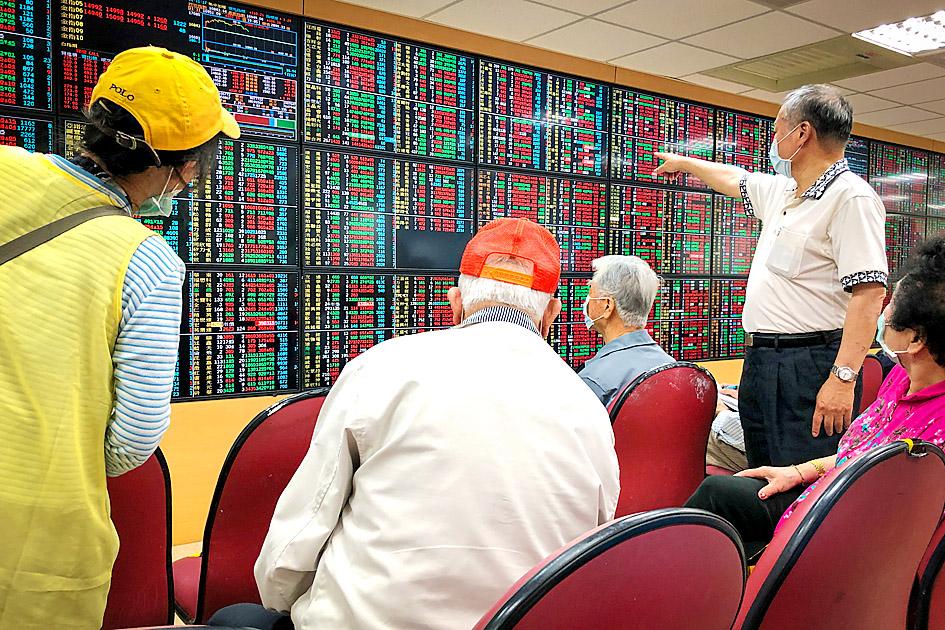A new market-making mechanism is to start on June 30 to improve the market liquidity of 140 stocks listed on the Taiwan Stock Exchange (TWSE) and the Taipei Exchange, the Financial Supervisory Commission said yesterday.
The TWSE has selected 60 stocks and the Taipei Exchange has chosen 80 to be included in the mechanism, Securities and Futures Bureau Deputy Director-General Tsai Li-ling (蔡麗玲) told a videoconference, without identifying the stocks.
The chosen stocks had lower-than-average turnover last year, but are worth investing in, with earnings per share of more than NT$2 and dividends distributed, Tsai said.

Photo: CNA
Eight brokerages would serve as market makers to help boost the trading volume of the stocks, she added.
The market makers would have an obligation to give buy and sell quotations, and they could not place immediate-or-cancel or fill-or-kill orders, while their quotations should remain valid for at least half of the trading session, the exchanges said.
The market makers’ sell quotation could not be higher than their buy quotation for the same stocks by more than 3 percent, and once their quotations are accepted, they must conduct the transaction immediately, the exchanges’ rules showed.
For example, if a brokerage’s buy quotation for a stock is set at NT$100, its sell quotation could not surpass NT$103, TWSE trading division director Ben Chen (陳正斌) told the Taipei Times by telephone.
“We set the 3 percent limit as the market makers’ main mission is to boost the stocks’ trading volume, and it would not be realistic to expect investors to accept overly high selling prices for such stocks,” Chen said.
The 3 percent range should provide enough flexibility for brokerages to adjust their price setting and profit, Chen said.
The trading volume of any stock could not be less than 5,000 shares in a single transaction, and the valuation of each transaction could not be lower than NT$200,000, Chen said.
Market makers would not be required to give buy or sell quotations every day, but the number of the days they give quotations should be at least as high as 80 percent of the total days of that month, the rules showed.
The market-making mechanism is expected to direct retail investors’ attention to stocks that could be good choices, but are unpopular, Chen said.
“Investors are concerned about the liquidity problem of stocks. Even if a stock is a good target, investors would not consider it if the turnover is too low for fear of not being able to sell it in the future,” he said.

South Korea’s equity benchmark yesterday crossed a new milestone just a month after surpassing the once-unthinkable 5,000 mark as surging global memory demand powers the country’s biggest chipmakers. The KOSPI advanced as much as 2.6 percent to a record 6,123, with Samsung Electronics Co and SK Hynix Inc each gaining more than 2 percent. With the benchmark now up 45 percent this year, South Korea’s stock market capitalization has also moved past France’s, following last month’s overtaking of Germany’s. Long overlooked by foreign funds, despite being undervalued, South Korean stocks have now emerged as clear winners in the global market. The so-called “artificial intelligence

‘SEISMIC SHIFT’: The researcher forecast there would be about 1.1 billion mobile shipments this year, down from 1.26 billion the prior year and erasing years of gains The global smartphone market is expected to contract 12.9 percent this year due to the unprecedented memorychip shortage, marking “a crisis like no other,” researcher International Data Corp (IDC) said. The new forecast, a dramatic revision down from earlier estimates, gives the latest accounting of the ongoing memory crunch that is affecting every corner of the electronics industry. The demand for advanced memory to power artificial intelligence (AI) tasks has drained global supply until well into next year and jeopardizes the business model of many smartphone makers. IDC forecast about 1.1 billion mobile shipments this year, down from 1.26 billion the prior

NEW IDENTITY: Known for its software, India has expanded into hardware, with its semiconductor industry growing from US$38bn in 2023 to US$45bn to US$50bn India on Saturday inaugurated its first semiconductor assembly and test facility, a milestone in the government’s push to reduce dependence on foreign chipmakers and stake a claim in a sector dominated by China. Indian Prime Minister Narendra Modi opened US firm Micron Technology Inc’s semiconductor assembly, test and packaging unit in his home state of Gujarat, hailing the “dawn of a new era” for India’s technology ambitions. “When young Indians look back in the future, they will see this decade as the turning point in our tech future,” Modi told the event, which was broadcast on his YouTube channel. The plant would convert

People stand in a Pokemon store in Tokyo on Thursday. One of the world highest-grossing franchises is celebrated its 30th anniversary yesterday.